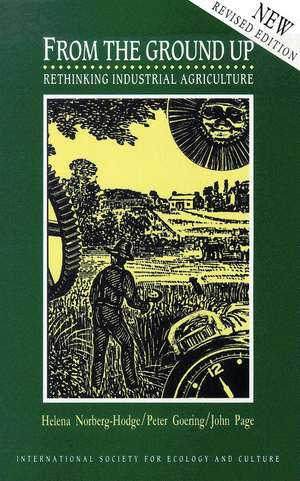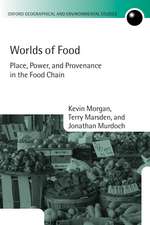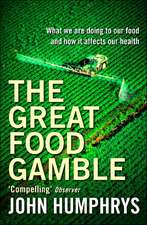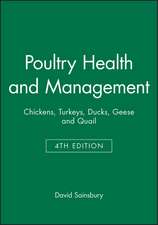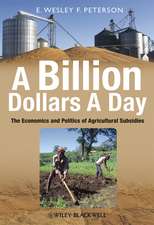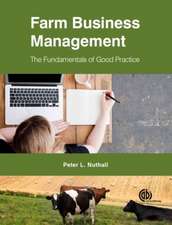From the Ground Up: Rethinking Industrial Agriculture
Autor Helena Norberg-Hodge, Peter Goering, John Pageen Limba Engleză Paperback – 31 ian 2001
Preț: 143.66 lei
Preț vechi: 157.43 lei
-9% Nou
Puncte Express: 215
Preț estimativ în valută:
27.49€ • 28.78$ • 22.75£
27.49€ • 28.78$ • 22.75£
Carte tipărită la comandă
Livrare economică 07-21 aprilie
Preluare comenzi: 021 569.72.76
Specificații
ISBN-13: 9781856499941
ISBN-10: 1856499944
Pagini: 160
Dimensiuni: 156 x 234 x 13 mm
Greutate: 0.18 kg
Ediția:2
Editura: Bloomsbury Publishing
Colecția Zed Books
Locul publicării:London, United Kingdom
ISBN-10: 1856499944
Pagini: 160
Dimensiuni: 156 x 234 x 13 mm
Greutate: 0.18 kg
Ediția:2
Editura: Bloomsbury Publishing
Colecția Zed Books
Locul publicării:London, United Kingdom
Notă biografică
Helena Norberg-Hodge is director of both the Ladakh Project and ISEC. Her formal training was in linguistics, including work at MIT with Noam Chomsky. She has lectured extensively on environmental issues in both Europe and North America, and is the author of Ancient Futures: Learning from Ladakh (1991), which explores the root causes behind today's environmental and social malaise, In 1986, she received the Right Livelihood Award, commonly known as the 'Alternative Nobel Prize'.Peter Goering graduated in civil engineering from Princeton University. He received his MA from the Energy and Resources Group of the University of California at Berkeley, a department which conducts interdisciplinary research into the relationship between resources, society and the environment. He is currently preparing his doctoral dissertation on 'Sustainable Development and the Contradictions of Modernism', while also working as the ISEC's Research Coordinator.John Page was trained as a barrister in London. For the last decade he has coordinated the technical, educational and agricultural activities of the Ladakh Project, and is now programmes director of ISEC. He is the producer/director of two recent films: The Future of Progress, a compilation of interviews with internationally known environmentalists, and Ancient Futures: Lessons from Little Tibet, a documentary based on Ms Norberg-Hodge's book.
Cuprins
Introduction: Shifting from Global to Local: Sowing the Seeds of Community Part I: Industrial Agriculture: Broken Promises 1. The Context of Industrial Agriculture 2. New Seeds: Meeting Corporate Needs 3. Chemical Fertilisers: Artificial Abundance 4. Pesticides: The Deadly Solution 5. Animal Husbandry: Farm as Factory 6. Mechanisation: The Technological Treadmill 7. The Bigger Picture 8. Biotechnology and 'Free' Trade: More of the Same Part II: The New Agriculture: Back to Basics 9. The Context of Ecological Agriculture 10. Learning From the Past 11. Techniques of Ecological Agriculture 12. Positive Trends 13. 'Counter-Development' and New Ways Forward Appendixes
Recenzii
A concise and very readable book covering many of the contradictions of industrial agriculture and linking North/South problems in a very satisfactory way.
A superb overview ... Not only details the cul-de-sac into which industrialized agriculture has taken us, but provides useful insights into ways out of the crisis.
Both a deeply disturbing and an inspiring book that combines, for the first time, a comprehensive critique of industrial agriculture with visionary reviews of the potential of the new worldwide movement towards ecological agriculture.
There can be few more compellingly presented arguments for a radical and global move to organic agriculture than this. The authors have succeeded in focusing on the key factor behind the mass degradation of our fragile farmlands. They have also clearly demonstrated the existence of a practical ecological alternative.
I have often wanted a short, coherent argument about the nature of industrial agriculture, and an outline of realistic alternatives to it. At last, here is such a book.
A superb overview ... Not only details the cul-de-sac into which industrialized agriculture has taken us, but provides useful insights into ways out of the crisis.
Both a deeply disturbing and an inspiring book that combines, for the first time, a comprehensive critique of industrial agriculture with visionary reviews of the potential of the new worldwide movement towards ecological agriculture.
There can be few more compellingly presented arguments for a radical and global move to organic agriculture than this. The authors have succeeded in focusing on the key factor behind the mass degradation of our fragile farmlands. They have also clearly demonstrated the existence of a practical ecological alternative.
I have often wanted a short, coherent argument about the nature of industrial agriculture, and an outline of realistic alternatives to it. At last, here is such a book.
